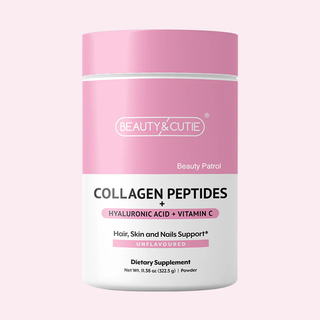Skin blemishes can be frustrating and affect our self-confidence. Whether it's acne, dark spots, or uneven skin tone, we all desire clear and flawless skin. In this article, we will explore various effective methods and remedies to help you get rid of skin blemishes. From skincare routines to natural remedies, we will provide expert advice and guidance to help you achieve the beautiful and radiant skin you desire.
What Are Skin Blemishes?
Acne, dark spots, scars, redness, and uneven skin tone are all examples of skin flaws. Hormonal fluctuations, heredity, UV radiation, environmental toxins, and careless skincare routines are all potential triggers for these flaws. Although they can show up anywhere, they tend to cluster in the most obvious places: the face, chest, and back.
What Causes Skin Blemishes?
There are many different types and causes of skin blemishes, here are the most common ones:
- Acne: Acne is a common skin condition caused by the overproduction of oil, bacteria, and dead skin cells clogging the pores. This can lead to the formation of pimples, blackheads, whiteheads, and even cysts.
- Hyperpigmentation: Hyperpigmentation occurs when there is an increase in melanin production, resulting in dark spots or patches on the skin. This can be caused by sun exposure, hormonal changes, inflammation, or injury to the skin.
- Scarring: Scars are the result of the body's natural healing process after an injury, inflammation, or acne. They can be raised or depressed and can vary in color.
- Uneven Skin Tone: Uneven skin tone refers to patches of skin that are darker or lighter than the surrounding area. This can be caused by excessive sun exposure, hormonal changes, or certain medical conditions.
- Redness: Redness of the skin can be caused by inflammation, irritation, or certain skin conditions such as rosacea or eczema.
- Age Spots: Age spots, also known as liver spots or sun spots, are flat tan, brown, or black spots that appear on the skin as a result of sun damage. They are most commonly found on areas of the skin that are frequently exposed to the sun, such as the face, hands, shoulders, and arms.
- Birthmarks: Birthmarks are markings on the skin that are present at birth or develop shortly after. They can appear in various shapes, sizes, and colors, and are caused by an overgrowth of blood vessels or pigment cells in the skin.
- Melasma: Melasma is a common skin condition characterized by dark, irregular patches on the face. It is often caused by hormonal changes, such as pregnancy or the use of hormonal contraceptives.
- Rashes and Marks: Rashes and marks can be caused by a variety of factors, including allergic reactions, irritants, insect bites, and certain skin conditions. These can result in redness, itching, swelling, and the appearance of blemishes on the skin.
- Papules: Papules are small raised bumps on the skin that are typically red or pink in color. They are usually caused by inflammation or infection of the hair follicles or oil glands in the skin.
- Dark Blemishes and Discolorations: Dark blemishes and discolorations on the skin can be caused by various factors, such as acne, sun damage, hormonal changes, or inflammation. These blemishes can range in color from brown to black and can be flat or raised. They can be particularly frustrating and can affect one's self-confidence.
Are Skin Blemishes a Sign Of a Serious Health Issue?
They are typically not a sign of a serious health issue. Most skin blemishes are caused by factors such as hormonal changes, genetics, poor skincare routine, and environmental factors. Pimples and acne, for example, occur when the pores on our skin become clogged with oil, dead skin cells, and bacteria. Dark spots, on the other hand, are usually a result of hyperpigmentation caused by sun exposure, hormonal changes, or inflammation.
While skin blemishes may not be indicative of a serious health issue, they can sometimes be a symptom of an underlying condition. For instance, persistent acne or sudden onset of severe acne could be a sign of hormonal imbalance or an underlying medical condition such as polycystic ovary syndrome (PCOS). In such cases, it is advisable to consult a dermatologist or healthcare professional for a proper diagnosis and treatment.
Are Skin Blemishes Contagious?
Most skin blemishes are not contagious. Acne, for example, is not a contagious condition. It is primarily caused by excess oil production, clogged pores, and bacteria on the skin. While it may seem like acne can spread from one person to another, it actually cannot be transmitted through casual contact.
However, there are certain skin conditions that can be contagious and may lead to blemishes. For instance, if you come into contact with someone who has a contagious skin condition like scabies or impetigo, you may develop blemishes as a result. These conditions are caused by specific pathogens or bacteria that can spread through direct contact or the sharing of personal items.
How To Get Rid Of Skin Blemishes
Maintain a Consistent Skincare Routine
A good skincare routine is essential for getting rid of skin blemishes. Start by cleansing your face twice a day to remove dirt, oil, and makeup. Use a gentle cleanser that is suitable for your skin type. Follow up with a toner to balance your skin's pH levels and remove any remaining impurities. Apply a moisturizer to hydrate your skin and prevent dryness. Lastly, don't forget to protect your skin from the sun by applying a broad-spectrum sunscreen with at least SPF 30.
Use Topical Treatments
There are numerous topical treatments available that can target specific skin blemishes. For acne, look for products that contain ingredients like salicylic acid or benzoyl peroxide, which can help unclog pores and reduce inflammation. For dark spots and hyperpigmentation, consider using products with ingredients like vitamin C, retinol, or kojic acid, which can help fade the discoloration over time. It's important to be patient with topical treatments as they may take several weeks to show noticeable results.
Exfoliate Regularly
Exfoliation is an important step in your skincare routine to help remove dead skin cells and promote cell turnover. This can help improve the appearance of blemishes and reveal smoother, brighter skin. Choose a gentle exfoliant, such as a chemical exfoliant with alpha hydroxy acids (AHAs) or beta hydroxy acids (BHAs), or a physical exfoliant with gentle beads or granules. Be sure not to over-exfoliate, as this can irritate the skin and worsen blemishes.
Consider Professional Treatments
If you're struggling to get rid of stubborn blemishes, it may be worth seeking professional treatments. Dermatologists or estheticians can offer a range of treatments, such as chemical peels, laser therapy, or microdermabrasion, which can help improve the appearance of blemishes and even out your skin tone. These treatments may require multiple sessions and can have varying levels of downtime, so be sure to consult with a professional to determine the best option for you.
Protect Your Skin
Prevention is key when it comes to skin blemishes. Protect your skin from sun damage by wearing sunscreen every day, even on cloudy days. Avoid excessive sun exposure, especially during the peak hours of 10 am to 4 pm. Additionally, try to minimize inflammation and irritation by using gentle skincare products, avoiding picking or popping pimples, and protecting your skin from harsh environmental factors like pollution and extreme temperatures.
Conclusion
In conclusion, acne, hyperpigmentation, scarring, uneven skin tone, redness, age spots, birthmarks, melasma, rashes, papules, and dark spots can all cause skin flaws.To get rid of skin problems, you have to be patient and keep at it. By using topical treatments, exfoliating your skin regularly, and protecting your skin, you can effectively reduce the look of blemishes and get a better complexion. If over-the-counter products don't work, see an expert for more advanced treatments. Self-care is an investment in your health, so enjoy the journey to clearer, brighter skin.
Final Thoughts
Discover the exquisite world of beauty with Beauty and Cutie. As experts in the field, we excel at creating top-quality collagen peptides .Our supplements go beyond traditional beauty products; they are a testament to unlocking your inner beauty and unleashing your true potential. Join countless individuals across America in their pursuit of beauty with Beauty and Cutie.
Sources
- https://www.medicalnewstoday.com/articles/323808
- https://www.colorescience.com/blogs/learn/how-to-manage-an-uneven-skin-tone
- https://www.aad.org/public/diseases/a-z/melasma-overview
- https://my.clevelandclinic.org/health/diseases/22905-acne-papules
5.https://www.medicalnewstoday.com/articles/324833
*These statements have not been evaluated by the Food and Drug Administration. This product is not intended to diagnose, treat, cure or prevent any diseases.


